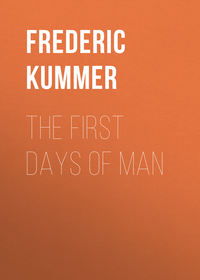 полная версия
полная версияThe Film of Fear
"Yes. Quite early."
"Then we had best leave matters until then. Good night. Good night, Mrs. Morton." He turned and started toward the door.
He had proceeded but a few steps, when the three occupants of the room were startled by a series of sudden and agonizing cries. From the rear of the apartment came a succession of screams so piercing in their intensity, so filled with horror, that they found themselves for a moment unable to stir. Then Mrs. Morton gave a cry of anguish, and darted out into the hall, closely followed by Duvall and Mr. Baker.
The screams continued, filling the entire apartment with their clamor. That the voice which uttered them was that of Ruth Morton none of the three doubted for a moment. With sinking hearts they went on, prepared for the worst. Duvall found himself dreading the moment when they should reach the bedroom door, and face the girl, her beauty, perhaps, disfigured beyond all recognition.
There was a sharp turn, at the end of the hall, into a shorter cross hall, at the end of which was the door of Ruth's bedroom. It was closed, but as though in response to Mrs. Morton's agonized appeals, it suddenly opened as they reached it, and Ruth Morton, pale as death, appeared.
With wide open eyes staring straight ahead, she half stepped, half fell through the doorway, her slender figure clothed only in her night dress. "Ruth," Mrs. Morton screamed, as she caught sight of her daughter.
The girl tried to say something, but her tongue failed her. Then, with a faint moan, she lurched forward and fell limply into her mother's arms.
PART II
CHAPTER VII
When Duvall, Mr. Baker, of the motion picture company, and Mrs. Morton rushed down the hallway of the latter's apartment in response to the screams from Ruth's bedroom, they were one and all convinced that the girl had suffered some terrible injury – that the mysterious threats to destroy her beauty which had been made during the past few days had been converted into some frightful reality.
One glance at the girl's white face as she fell fainting into her mother's arms told the detective that their fears had been, to that extent at least, groundless. The girl's lovely features, although drawn and contorted by fear, showed no signs of the disfigurement they feared.
Leaving the girl to her mother's care, Duvall, closely followed by Baker, dashed into the bedroom, and at once switched on the lights. The place, to the intense surprise of both, presented a picture of perfect quiet and order. The bed clothing was slightly disarranged, but this of course was but natural, since Ruth had sprung up under the influence of some terrible fear, and rushed from the room. Everything else seemed in its place.
Duvall's first act was to examine the window. The one fronting on the fire escape was closed and tightly fastened. It was perfectly clear that no one had entered the room in that way.
The other window, facing on the court, was raised a few inches, just as Mrs. Morton had left it half an hour before. Duvall turned to his companion with a puzzled frown.
"I had supposed, Mr. Baker," he said, "that someone had entered this room, and frightened Miss Morton while she was asleep, but that is impossible. The windows have not been disturbed."
Baker glanced at the one which faced the court.
"That one may have been," he said, indicating it with a nod. "Someone may have come in that way, raising the window to effect an entrance, and lowering it again after leaving."
"I admit that what you say would be possible, were there any way in which the window might be reached from outside," Duvall replied, "but if you will look out, and tell me how anyone could make an entrance from the court, I will agree to the possibility you suggest."
Baker raised the window, and glanced out.
"The apartment above," Duvall went on, "is unoccupied, and the window above is closed and fastened. The little attic in the adjoining house is unused, although that is not important, since no one could reach this window from it, in any event. Can you suggest any other way?"
Mr. Baker shook his head.
"She must have been frightened by some terrible nightmare," he said. "I do not wonder at it. She has gone through enough to upset anybody's nerves. Suppose we go back and question her."
"Just a moment," exclaimed Duvall. Then he dropped upon his knees beside the disordered bed, and began to examine the surface of the counterpane with minute care.
"What is it?" Baker asked, joining him.
"I don't know – yet," returned Duvall, as he took a magnifying glass from his pocket and proceeded to scrutinize with the greatest interest some marks upon the counterpane's surface. Presently he rose, replaced the glass in his pocket, and turned to his companion.
"There is something very astonishing about this whole affair," he exclaimed. "What do you make of those?" He indicated a series of dark smudges upon the bedspread, arranged in little groups.
Baker bent over and examined the marks with an exclamation of surprise.
"Why – they look like finger prints," he cried. "Large finger prints."
"It is impossible to say whether they are finger prints or not," Duvall replied. "As you see, there are a great many of them, very confusingly arranged. But there is something else, that you have not noticed. What do you suppose could have made a mark like this?" He pointed to a long straight dark line, which extended half way across the counterpane, and pointed directly toward the window which faced upon the court. The line was very faint, but clearly defined, as though someone had laid a thin dusty stick across the bed.
"I can't make anything of it," Baker exclaimed, gazing toward the window.
"Nor can I," said Duvall. "At one time, because of certain indentations on the letters found in this room, I had thought that they might have been introduced through the partly opened window by means of a long rod, a fishing pole, perhaps. This mark on the counterpane appears to bear out that theory. The smudges which look like finger prints may have been merely the points at which the end of the pole, or whatever was attached to the end of the pole, came in contact with the bed. All that is perfectly supposable. But you can see for yourself that if a long pole were thrust through the window, raised as the latter was but a trifle above the level of the bed, the other end of such a pole must of necessity have been held at approximately the same level, and the only point outside the window from which it could have been so held is in the air, forty feet above the bottom of the court! The thing is absurd."
"There is, of course, the window of the apartment below," Baker suggested. "Might not it have been used?"
"I thought of that," Duvall replied. "You can see for yourself that even a tall man standing on the window sill below, would find not only his hands, but even his head, far below the sill of this window, nor could anyone so support themselves, without something to hold on to. But all that is beside the question. The people in the apartment below are friends of Mrs. Morton's, a middle-aged man and his wife, with two young children. They are eminently respectable people, and quite above suspicion."
"Then I give the thing up," exclaimed Baker. "Suppose we have a talk with Miss Morton."
They found the girl lying on a couch in the library, with her mother sitting beside her. She seemed very weak and quiet, but in full possession of her faculties. Duvall drew up a chair, and asked her if she felt able to tell them what had occurred.
"Yes," she replied in a faint voice, her face still showing evidences of her fright. "I will try to tell you exactly what happened."
"I had taken some medicine to make me sleep, before I got into bed, because I was very nervous and upset. When mother came back to fix the windows I was already drowsy, and just remember that she turned out the lights, and then I must have dozed.
"All of a sudden I heard a strange rasping noise, and I woke up, with the feeling that there was someone in the room. I don't know just why I felt so sure of that, whether it was merely a sense of someone's presence, or the sound of someone moving about near my bed. I think, however, that it was the latter.
"The room was dark, of course, but enough light came through the windows to make a moving object distinguishable. I looked about, terribly frightened, but for a moment I saw nothing. The noise I had heard at first continued. Then without the least warning, a hand seemed to clutch at the bedclothes, and I saw above me, bending over me, a terrible dark face, exactly like the grinning death's head on those letters I've been getting.
"I lay perfectly still, frozen with horror, and in a moment the face had disappeared, and then I began to scream. Right after that I sprang from the bed and threw open the door, and found mother and Mr. Baker and yourself standing in the hall. That is all I know."
Duvall looked at her for a moment, puzzled.
"Are you sure you really saw someone leaning over you? Might it not have been an illusion, the result of your nervous condition?"
"No. I am certain someone was there – someone quite tall, I should say, and with a terrible, evil face."
"It might have been a mask, of course," Duvall suggested. "Someone wearing a mask."
"Yes. It might have been. It was too dark for me to tell, of course. But I remember the eyes, for I saw them distinctly. They were only a few inches from my own." She put her hands to her face and shuddered. "It was terrible, terrible. I shall never sleep in that room again."
"There – there, dearie," Mrs. Morton whispered in a soothing voice. "You need not sleep there. You can lie right here, for the rest of the night, and I will stay with you and see that no one harms you."
"That would be best, Mrs. Morton," Duvall remarked. "And to-morrow I suggest that you and your daughter move, temporarily at least, to another location. Some quiet hotel, where you will not be subject to these terrible annoyances. I cannot imagine how it is done, but in some way, some almost superhuman way, it seems, someone can apparently either enter your daughter's room, or at least reach it from without, at will."
"What do you mean by that?" asked Ruth, somewhat mystified.
"I mean this, Miss Morton. I do not believe that there was anyone in your room to-night. I do not believe that there has ever been anyone there. But I do believe that the two letters we found there were introduced from without, in some mysterious way, at the end of a long pole, or rod. And I think that what frightened you so to-night was merely a mask, a grotesque representation of the seal used on the letters, and pushed toward you in some way, as you lay in bed for the purpose of terrifying you."
"But – why – why?" the girl cried.
"I cannot say. But it has occurred to me that these people, whoever they are, that are trying to injure you, may not intend any physical violence at all, at least for the present, but may be depending solely upon the terrible and insidious power of suggestion. You must bear this possibility in mind, and try to control your fears. I can readily believe that thirty days of this sort of persecution, and you would be a physical and mental wreck. But we shall stop it. You need have no fears on that score." Mrs. Morton turned to her daughter with a few words of explanation.
"Mr. Richards, or rather, Mr. Duvall, is not a newspaper man, Ruth, but a detective, who is trying to bring the wretches who are annoying you to justice. I feel every confidence in him."
Ruth turned toward Duvall a very white and pathetic face.
"I hope you will succeed, Mr. Duvall," she said, in a weak voice. "I cannot stand much more."
"I shall, Miss Morton. And now," he turned to Mr. Baker, "I think we had better go, and let Miss Morton get some rest. I will come here in the morning, Mrs. Morton," he continued, addressing the girl's mother, "and we will consider further the question of your moving to a hotel. Meanwhile I do not think you have anything further to fear this evening. Good night."
Before leaving the apartment he made another examination of the marks upon the bedclothes, then closed and fastened both windows, and locked the door of the room.
Mr. Baker left him at the corner.
"You will come to the studio to-morrow, of course."
"By all means. I shall come down with Miss Morton and her mother. That will give us an opportunity to investigate further the matter of the missing photograph, and also to talk over that plan I had in mind concerning the new film you are to show at the Grand to-morrow night. It is barely possible that, by means of a plan I have in mind, we may be able to locate the person or persons responsible for all this trouble."
"I certainly hope so," said Baker, as he took his leave. "This thing is getting on my nerves, too."
Duvall made his way back to his hotel, as much mystified as ever. He had thought for a moment of spending the night on the sidewalk in front of the Mortons' apartment, watching the windows facing on the court, but his experience told him that it would be useless. The alarm which Ruth had made, the closing of the windows of her bedroom, the locking of the door, all made it highly improbable that any further attempt would be made to annoy her during the night. He walked along in a state of intense preoccupation, trying to discover some reasonable explanation of the astonishing events of the day.
Once he had an impression, a feeling, that he was being followed, but when he turned around, there was no one in sight but a slightly tipsy man, and a couple of young girls, far down the street. He dismissed the thought from his mind, and proceeded to his hotel.
It was not yet eleven o'clock, and Grace was waiting for him in the little parlor of their suite.
"Well, Richard," she remarked, as he came in, "you've had quite a day of it."
"Yes, quite," he replied, throwing himself into a chair. "What have you been doing with yourself?"
"Shopping, mostly. I found it rather dull. I went to a moving picture this afternoon. Saw your friend Ruth Morton. She certainly is a very beautiful girl."
"Yes – very," Duvall replied, absently.
"Have you seen her to-day?" Grace went on, with a smile.
"Yes. Why?"
"Oh – nothing. I was just thinking."
Duvall burst into a laugh, and rising, went over to his wife and kissed her.
"For heaven's sake, Grace," he said, "don't be silly. I'm not interested in motion picture actresses."
"You weren't, I'll admit, nor in motion pictures either, until recently, but perhaps you have changed. I could understand any man being fascinated by a girl like Ruth Morton."
Duvall did not pursue the question. It was a hard and fast rule between them not to discuss his professional work. And Mrs. Morton had made it a point that he should confide in no one, not even his wife.
"Well," he said, picking up an evening paper, "I'm not fascinated yet. No letters for me to-day, I suppose."
"None." Grace went on with her sewing.
They sat for a while in silence. Presently there came a knock on the door, and a boy appeared, bearing a telegram, Duvall opened it carelessly, thinking it some word from the overseer of his farm. He sat up with sudden astonishment as he read the contents of the message.
"Keep out," the telegram read, "or you will find that we can strike back."
Duvall placed the telegram in his pocket with a frown. So it appeared that in spite of all his care, his connection with the case was known. How this was possible he could not imagine. His first visit to the Morton apartment that day had been in the guise of a workman. His subsequent appearance at the studio, and later, at the apartment, had been in the character of a newspaper man. There was only one explanation. Someone had watched him while he was making his examination of Ruth Morton's room, and, subsequently, had followed him from the apartment to his hotel. He began to realize that he was dealing with a shrewd brain, and one that acted with almost uncanny quickness and precision. He determined that, if Mrs. Morton and her daughter changed their place of residence the following day, he would do the same. He said nothing of his intentions to Grace, however. It was more than ever necessary that he preserve secrecy in this case.
"No bad news, I hope, Richard," Grace remarked, glancing up from her sewing.
"No. Nothing serious. Have you heard anything from home?"
"Yes. Everything is going along quite smoothly. The boy is well and happy, and Mrs. Preston says to stay as long as we want to."
"Well," said Duvall, rising and throwing down his newspaper, "if things don't go better than they have been going to-day, I may have to be here some time. I've got a queer case on, Grace. I'd like to tell you about it, but I can't. But it is quite unusual. Some features to it that I have never met before."
"Oh – I wish I might help you," Grace exclaimed. "You know how often I have done so in the past."
"I know, dear. But I am bound to secrecy, for the present at least. Suppose we turn in now. I've got to get up early."
"All right," Grace said. "But if you need my help, don't hesitate to ask me. To tell you the truth, I'm having an awfully slow time."
CHAPTER VIII
Duvall made his appearance at the Morton apartment the following morning in his ordinary guise. It was his intention, when the time came, to disappear from the case in his normal person, to reappear in it, later, in a complete disguise. But that time, he felt, had not yet arrived.
Mrs. Morton received him in fairly good spirits. Her daughter, she said, had had a restful night, in spite of her terrible experience. When Ruth rose from the breakfast table to greet him, he was gratified to find that she showed no great traces of the fright of the evening before.
"I'm feeling almost myself again, Mr. Duvall," she said. "I've made up my mind not to let these people frighten me again."
"Nothing further occurred last night, of course," Duvall asked.
"Nothing," replied Mrs. Morton. "I could almost believe the whole thing a horrible dream." They did not touch on the question of going to a hotel, during the short interval that elapsed before they set out for the studio. Duvall was anxious to see Mr. Baker. He hoped sincerely that by means of the photograph which had been in the company's files, some trace of the persons responsible for the threats might be obtained.
The trip to the studio was made most uneventfully, and Ruth started in with her work in very good spirits. Duvall, leaving the girl with her mother, sought out Mr. Baker in the latter's private office.
"Hello!" Baker cried, grasping the detective's hand warmly. "Anything new?"
"Not a thing. How about the photograph we were going to trace?"
Mr. Baker frowned.
"It's a curious thing," he replied. "Most curious. The picture in question was, I find, taken from the files by Mr. Moore, our president, and placed on his desk. He always admired it, and kept it there, along with a number of others, to show to persons calling upon him. Now, it seems, it has disappeared. There is not the slightest trace of it." "But," Duvall objected, "who could have taken it?"
"A dozen people. Half a hundred, I guess. You see, Mr. Moore's office is a big room, just beyond here." He rose, and led the detective through a short corridor. "Here it is," he went on, throwing open the door. "This is where Mr. Moore receives his callers. It is his reception room, and no private papers are kept here. Those are all in the smaller office adjoining. This room is open at any time. After Mr. Moore leaves in the evening, and he often leaves early, anyone might come in here. And when the offices are closed, at night, I suppose any employee of the company might look in, if he cared to do so, without anyone objecting. You see, this is a sort of public room. The inner office is always kept locked, but there has never seemed to be any good reason for locking this one."
"Still, although you cannot tell who has taken the picture, it seems clear enough that it must have been removed by some one employed in the studio."
"Even that is by no means certain. So many people come here every day. All sorts of visitors, writers, actors, and the like. After business hours I don't doubt any number of persons enter this room, to look at the pictures of our great successes that hang on its walls. And then there are the caretakers, the scrub-women, and their friends. I find that they, many of them, bring in outsiders, after working hours, to look at the studio, and the famous offices. Of course it should not be, and it will not be, in the future, but up to now we have rather welcomed people from outside. It seemed good advertising."
Duvall followed his companion back to his office.
"Then this clue, like all the others in this singular case," he remarked, "seems to end in a blind alley."
"It seems so," assented Mr. Baker, gloomily. "What was your plan about the new film we're going to show to-night?"
Duvall was about to speak, but before he could do so, they heard a slight commotion in the hall outside. Then someone rapped violently on the door.
Both he and Baker sprang to their feet.
"Come in," the latter cried.
The door was flung open, and Mr. Edwards, the director, who was making the picture upon which Ruth Morton was working, strode hastily into the room. "Mr. Baker!" he exclaimed, then paused upon seeing Duvall.
"What is it?" Baker replied.
"Will you look here a minute, please?"
Baker went up to him, his face showing the greatest uneasiness.
"What's the matter?" he asked. "Anything wrong?"
"Yes. Miss Morton was going through the scene in the first part, where she gets the telegram, you know, and when she opened the message, and read it, she fainted."
"Fainted? What was in the telegram to make her faint?"
"Well, it ought to have read, 'Will call for you to-night, with marriage license – Jimmy.' That was the prop message we had prepared. But somebody must have substituted another one for it. This is what she read." He handed Baker a yellow slip of paper. "I can't make anything out of it."
Baker snatched the telegram from his hand with a growl of rage, and read it hastily. Then he passed it over to Duvall.
"What do you think of that?" he asked. Duvall gazed at the telegram with a feeling of helpless anger.
"Twenty-six days more," it read. "When you appear in your new picture at the Grand to-night, it will be your last. I shall be there." The grinning death's head seal was appended in lieu of a signature, as before.
A feeling of resentment swept over the detective. It seemed that these people acted as they saw fit, with supreme indifference to the fact that he was on their trail. Never before had he felt his skill so flouted, his ability made so light of. And yet, as usual, the message had apparently been delivered in such a way as to make tracing it impossible.
"Still at it, it seems," Mr. Baker remarked. "This thing has got to stop, and at once. I don't propose to let anybody make a monkey of me."
Duvall turned to the director, Mr. Edwards.
"Who prepared the original telegram?" he asked quickly.
Mr. Edwards looked at the detective in surprise, evidently wondering what this stranger had to do with the matter.
"Answer, Edwards. It's all right," snapped Mr. Baker.
"I prepared the property telegram," the director answered.
"When?"
"Last night. I knew it would be needed to-day."
"What did you do with it?"
"I left it on my desk. This morning I took it into the studio, and when the moment arrived, I gave it to the actor who took it to Miss Morton."
"Was he out of your sight, after you gave him the telegram?"
"No. He took it and walked right on the scene."
"Then he couldn't have substituted another for it?"
"No. It would have been impossible, unless he used sleight of hand."
"Before you gave the man the telegram where was it?"
"In my coat pocket."
"No chance, I suppose, of anyone having taken it out and substituting another."
"None."
"Then it is clear that the substitution must have been effected between the time you left your office last night, and your arrival here this morning."






